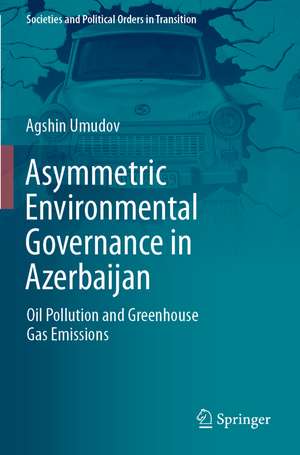Asymmetric Environmental Governance in Azerbaijan: Oil Pollution and Greenhouse Gas Emissions: Societies and Political Orders in Transition
Autor Agshin Umudoven Limba Engleză Paperback – 16 sep 2022
This book is an important contribution to scholarship on environmental governance in the post-Soviet space, an area that is poorly researched. Therefore, it is a must-read for researchers and scholars interested in post-Soviet studies, as well as in the nexusbetween mineral-rich regions and how social policy is created, e.g., environment, education, and healthcare. In addition, this book will be of tremendous importance for policymakers and international organizations as it looks into the motivation of authoritarian states in the post-Soviet space for environmental measures.
| Toate formatele și edițiile | Preț | Express |
|---|---|---|
| Paperback (1) | 723.56 lei 6-8 săpt. | |
| Springer International Publishing – 16 sep 2022 | 723.56 lei 6-8 săpt. | |
| Hardback (1) | 729.53 lei 6-8 săpt. | |
| Springer International Publishing – 15 sep 2021 | 729.53 lei 6-8 săpt. |
Din seria Societies and Political Orders in Transition
- 24%
 Preț: 572.26 lei
Preț: 572.26 lei - 18%
 Preț: 783.35 lei
Preț: 783.35 lei - 18%
 Preț: 1012.84 lei
Preț: 1012.84 lei - 18%
 Preț: 957.62 lei
Preț: 957.62 lei - 18%
 Preț: 961.72 lei
Preț: 961.72 lei - 15%
 Preț: 641.03 lei
Preț: 641.03 lei - 15%
 Preț: 647.92 lei
Preț: 647.92 lei - 15%
 Preț: 697.47 lei
Preț: 697.47 lei - 15%
 Preț: 653.33 lei
Preț: 653.33 lei - 15%
 Preț: 636.45 lei
Preț: 636.45 lei - 15%
 Preț: 696.18 lei
Preț: 696.18 lei - 15%
 Preț: 641.03 lei
Preț: 641.03 lei - 18%
 Preț: 722.12 lei
Preț: 722.12 lei - 18%
 Preț: 781.31 lei
Preț: 781.31 lei - 5%
 Preț: 715.35 lei
Preț: 715.35 lei - 18%
 Preț: 1580.60 lei
Preț: 1580.60 lei - 18%
 Preț: 785.11 lei
Preț: 785.11 lei -
 Preț: 382.75 lei
Preț: 382.75 lei - 18%
 Preț: 784.13 lei
Preț: 784.13 lei - 18%
 Preț: 783.35 lei
Preț: 783.35 lei - 18%
 Preț: 730.47 lei
Preț: 730.47 lei
Preț: 723.56 lei
Preț vechi: 882.39 lei
-18% Nou
Puncte Express: 1085
Preț estimativ în valută:
138.46€ • 144.74$ • 117.01£
138.46€ • 144.74$ • 117.01£
Carte tipărită la comandă
Livrare economică 07-21 martie
Preluare comenzi: 021 569.72.76
Specificații
ISBN-13: 9783030821180
ISBN-10: 3030821188
Pagini: 208
Ilustrații: XVII, 208 p. 17 illus., 15 illus. in color.
Dimensiuni: 155 x 235 mm
Greutate: 0.33 kg
Ediția:1st ed. 2021
Editura: Springer International Publishing
Colecția Springer
Seria Societies and Political Orders in Transition
Locul publicării:Cham, Switzerland
ISBN-10: 3030821188
Pagini: 208
Ilustrații: XVII, 208 p. 17 illus., 15 illus. in color.
Dimensiuni: 155 x 235 mm
Greutate: 0.33 kg
Ediția:1st ed. 2021
Editura: Springer International Publishing
Colecția Springer
Seria Societies and Political Orders in Transition
Locul publicării:Cham, Switzerland
Cuprins
Chapter 1 - Research overview, context and problematization.- Chapter 2 - Overview of environmental governance in Azerbaijan.- Chapter 3 - Oil contamination: policy prioritization and un-politics of pollution?.- Chapter 4 - Corruption and weakened civil society: impact on environmental governance.- Chapter 5 - Explaining path dependent patterns in Azerbaijan’s environmental governance.- Chapter 6 - Reduction of GHG emissions: a comparative success?.- Chapter 7 - International pressure and domestic legitimacy.- Chapter 8 - Discussion on Findings.- Chapter 9 - Conclusion.
Notă biografică
Agshin Umudov is associated with the Otto Suhr Institute of Political Sciences, Freie Universität Berlin (Germany). Earlier, he was employed as a research assistant at the Department of European Studies and
International Relations of the Qafqaz University in Baku (Azerbaijan). From 2012-2013, he worked as a project assistant at Renewables Academy (RENAC AG) in Berlin for the “TrEff –Training in Energy Efficiency”
project, financed by the German Federal Ministry for Economic Affairs and Energy (BMWi) to support energy efficiency initiatives in Azerbaijan, Kazakhstan, and Ukraine.
project, financed by the German Federal Ministry for Economic Affairs and Energy (BMWi) to support energy efficiency initiatives in Azerbaijan, Kazakhstan, and Ukraine.
Textul de pe ultima copertă
This book examines why authoritarian governments are willing to address environmental problems that have an international impact, such as CO2 emissions, but are reluctant to address problems that have only a domestic impact. In a case study of Azerbaijani oil politics, it demonstrates how the incumbent Azerbaijani regime has taken important measures trying to address CO2 emissions while ignoring the damage caused by oil pollution on the Caspian coast. The book argues that resource-rich authoritarian governments are eager to join international environmental initiatives to improve their image, but they address domestic environmental issues mainly if they threaten their hold on power.
This book is an important contribution to scholarship on environmental governance in the post-Soviet space, an area that is poorly researched. Therefore, it is a must-read for researchers and scholars interested in post-Soviet studies, as well as in the nexusbetween mineral-rich regions and how social policy is created, e.g., environment, education, and healthcare. In addition, this book will be of tremendous importance for policymakers and international organizations as it looks into the motivation of authoritarian states in the post-Soviet space for environmental measures.
This book is an important contribution to scholarship on environmental governance in the post-Soviet space, an area that is poorly researched. Therefore, it is a must-read for researchers and scholars interested in post-Soviet studies, as well as in the nexusbetween mineral-rich regions and how social policy is created, e.g., environment, education, and healthcare. In addition, this book will be of tremendous importance for policymakers and international organizations as it looks into the motivation of authoritarian states in the post-Soviet space for environmental measures.
Caracteristici
Reveals the politics of asymmetric environmental governance in the post-Soviet area Finds a basis on first-hand interviews with key policy-makers and a deep study of government documents Shows how corruption weakened civil society organizations, and how path-dependent practices persist
